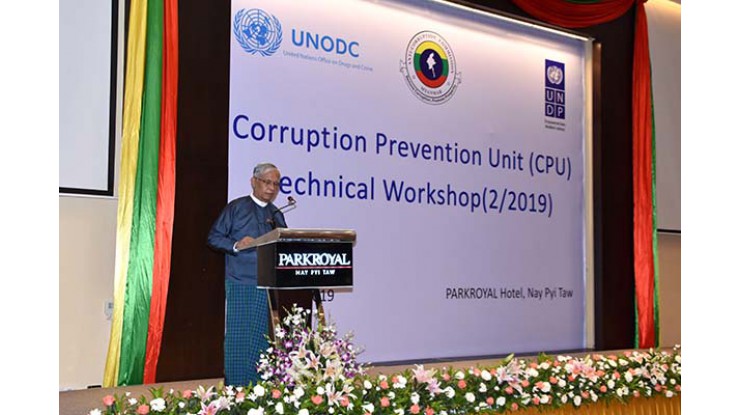အဂတိလိုက်စားမှုတားဆီးကာကွယ်ရေးအဖွဲ့(CPU) နည်းပညာဆိုင်ရာအလုပ်ရုံဆွေးနွေးပွဲ အမှတ်စဉ်(၂/၂၀၁၉) ကျင်းပခြင်း
- Wed, 24 July 2019

အဂတိလိုက်စားမှုတိုက်ဖျက်ရေးကော်မရှင်၊ ကုလသမဂ္ဂဖွံ့ဖြိုးမှုအစီအစဉ်(UNDP)နှင့် ကုလသမဂ္ဂမူးယစ်ဆေးဝါးနှင့်ပြစ်မှုဆိုင်ရာရုံး(UNODC)တို့ ပူးပေါင်းကျင်းပသည့် အဂတိလိုက်စားမှုတားဆီးကာကွယ်ရေးအဖွဲ့ (Corruption Prevention Unit - CPU) နည်းပညာဆိုင်ရာအလုပ်ရုံဆွေးနွေးပွဲအမှတ်စဉ်(၂/၂၀၁၉) ဖွင့်ပွဲအခမ်းအနားကို နေပြည်တော်ရှိ PARK ROYAL HOTEL တွင် ယနေ့နံနက် (၀၉:၀၀)နာရီ၌ ကျင်းပသည်။
ဖွင့်ပွဲအခမ်းအနားသို့ ကော်မရှင်ဥက္ကဋ္ဌနှင့် အဖွဲ့ဝင်များ၊ ပြည်ထောင်စုအစိုးရအဖွဲ့ရုံးဝန်ကြီးဌာန၊ ဒုတိယဝန်ကြီး၊ ပဲခူးတိုင်းဒေသကြီးအစိုးရအဖွဲ့၊ သယံဇာတ၊ သဘာဝပါတ်ဝန်းကျင်ထိန်းသိမ်းရေးနှင့် စည်ပင်သာယာရေးဝန်ကြီး၊ UNDP မှ Resident Representative, Mr. Peter Batchelor ၊ UNODC မှ Anti-Corruption Programme Manager, Ms. Marie Pegie Cauchois ၊ ပြည်ထောင်စုဝန်ကြီးဌာနများ၊ ပြည်ထောင်စုရှေ့နေချုပ်ရုံး၊ မြန်မာနိုင်ငံတော်ဗဟိုဘဏ်တို့မှ အမြဲတမ်းအတွင်းဝန်များနှင့် CPU အဖွဲ့ဝင်အဆင့်မြင့်အရာရှိများ၊ ကော်မရှင်ရုံးမှ ညွှန်ကြားရေးမှူးချုပ်များနှင့် CPU အဖွဲ့ဝင် အရာထမ်းများ၊ ကျွမ်းကျင်ပညာရှင်များ၊ ကမ္ဘာ့ဘဏ်မှ တာဝန်ရှိပုဂ္ဂိုလ်များ၊ ဖိတ်ကြားထားသူများ စုစုပေါင်း(၂၀၀)ဦးခန့် တက်ရောက်ကြပါသည်။
အခမ်းအနားတွင် အဂတိလိုက်စားမှုတိုက်ဖျက်ရေးကော်မရှင် ဥက္ကဋ္ဌ ဦးအောင်ကြည်က အဂတိလိုက်စားမှုတားဆီးကာကွယ်ရေးအဖွဲ့များကို ၂၀၁၉ ခုနှစ်၊ ဇန်နဝါရီလမှစတင်၍ ပြည်ထောင်စုဝန်ကြီးဌာန (၁၄)ခုတွင် ရှေ့ပြေးစီမံချက်ဖြင့် စတင်ဖွဲ့စည်းခဲ့ပါကြောင်း၊ မိမိတို့၏ စိတ်ဆန္ဒအလျှောက် ထပ်မံဖွဲ့စည်းလာသည့် ပြည်ထောင်စုဝန်ကြီးဌာနများရှိလာသဖြင့် ယခုအခါ ပြည်ထောင်စုဝန်ကြီးဌာန(၁၈)ခုတွင် CPU (၃၂)ဖွဲ့ ဖွဲ့စည်းထားပြီးဖြစ်ပါကြောင်း၊ ကော်မရှင်အနေဖြင့်လည်း CPU တစ်ခုချင်းစီ၏ လုပ်ဆောင်ချက်များကို ကော်မရှင်၏ နှစ်ပတ်လည်အစီရင်ခံစာတွင်ဖော်ပြ၍ နိုင်ငံတော်သမ္မတနှင့် အကြီးအကဲများသာမက ပြည်သူလူထုတစ်ရပ်လုံးသို့လည်း ပွင့်လင်းမြင်သာစွာ အသေးစိတ်တင်ပြသွားမှာဖြစ်ပါကြောင်း၊ သို့ဖြစ်ပါ၍ CPU များအနေဖြင့် တာဝန်ယူမှု၊ တာဝန်ခံမှုအပြည့်အဝဖြင့် မိမိတို့၏ ရည်မှန်းချက်တာဝန်များကို လက်တွေ့ကျကျအကောင်အထည်ဖော် ဆောင်ရွက်သွားကြရန်လိုအပ်ပါကြောင်း၊ CPU များသည် အချို့ဝန်ကြီးဌာနများတွင် ထိထိရောက်ရောက် စတင်လှုပ်ရှားဆောင်ရွက်နေပြီဖြစ်ပြီး ယခုဒုတိယအကြိမ်ပြုလုပ်သည့် အလုပ်ရုံဆွေးနွေးပွဲတွင် CPU နည်းပညာနှင့် လက်သုံးကိရိယာအသစ်များ တပ်ဆင်ပေးလိုက်မည်ဖြစ်သဖြင့် မကြာမီတွင် ပြည်သူလူထုကို ပိုမို၍ကျယ်ပြန့်စွာ ဝန်ဆောင်မှုပေးနိုင်မှာ ဖြစ်ကြောင်း၊
ယနေ့ပြုလုပ်သည့် နည်းပညာဆိုင်ရာအလုပ်ရုံဆွေးနွေးပွဲ(၂/၂၀၁၉)တွင် ဘာသာရပ်အသစ်များအနက် ကမ္ဘာ့ဘဏ်အုပ်စု၊ မြန်မာနိုင်ငံဆိုင်ရာရုံးက CPU Toolkit အဖြစ် လွှဲပြောင်းပေးအပ်မည့် (Proactive Beneficiary Engagement – PBE )လုပ်ငန်းသုံး ပရိုဂရမ်တစ်ခုလည်းပါဝင်မှာဖြစ်ပါကြောင်း ဤပရိုဂရမ်သည် မိမိတို့၏လိုအပ်ချက်နှင့်အညီ အသေးစားအဂတိလိုက်စားမှုများကို တိုက်ဖျက်ရာတွင် များစွာအသုံးဝင်လာမှာဖြစ်ပါကြောင်း၊ ဤနည်းပညာသည် CPU အဖွဲ့ဝင်များနှင့် ဝန်ဆောင်မှုရယူသော ပြည်သူတစ်ဦးချင်းတို့ကို တိုက်ရိုက်ချိတ်ဆက်ပေးပြီး မိမိရုံးဌာနတာဝန်ကို အလွဲသုံးစားပြုလုပ်နေသော တိုင်းဒေသကြီး/ ပြည်နယ်/ မြို့နယ်/ ရပ်/ကျေးရုံးမှ ဝန်ထမ်းများကို ပြုပြင်ထိန်းကျောင်းတည့်မတ်ခြင်းပြုနိုင်သည့် နည်းပညာဖြစ်ပါကြောင်း၊
ထိရောက်သော အရေးယူဆောင်ရွက်မှုများကြောင့် အဂတိလိုက်စားမှုသည် ဘေးအန္တရာယ်ကြီးမားကြောင်း၊ ယခုအခါ လူအများကအသိအမှတ်ပြုလာကြပြီဖြစ်ပါကြောင်း၊ ဒီမိုကရေစီပြုပြင်ပြောင်းလဲရေးခရီး ရှေ့ကိုပိုမိုရောက်ရှိလာသည်နှင့်အမျှ အဂတိလိုက်စားမှုပြုလုပ်လျှင် ဖော်ထုတ်အရေးယူခြင်းခံရမည့် ဘေးအန္တရာယ်သည် ပို၍ကြီးမားလာရန်သာရှိပါကြောင်း၊ ထို့ကြောင့် ပြည်သူ့ဝန်ထမ်းများနှင့် နိုင်ငံ့ဝန်ထမ်းများသည် အဂတိလိုက်စားမှုဘေးအန္တရာယ်ကို မိမိအပါအဝင် မိမိဌာနအဖွဲ့အစည်းများပေါ်သို့ ကျရောက်မလာစေရန်အတွက် အထူးသတိဝီရိယရှိကြဖို့လိုအပ်ပါကြောင်း၊ CPU များ၏ လုပ်ငန်းတာဝန်သည် မိမိဌာနအဖွဲ့အစည်းအား အဂတိလိုက်စားမှုကြောင့် ဖြစ်ပေါ်နိုင်သည့် ဘေးအန္တရာယ်များမှ ကင်းဝေးစေရန်ဖြစ်သလို အများပြည်သူအကျိုးစီးပွားကို ကာကွယ်ပေးနိုင်ရန်လည်းဖြစ်သည့်အတွက် ဌာနအကျိုးနှင့် အများပြည်သူအကျိုးတို့ တစ်ထပ်တည်းဖြစ်ပေါ်စေပါကြောင်း၊ ထို့ကြောင့် CPU ၏ လုပ်ငန်းတာဝန်များအပေါ် ဒွိဟသံသယပွားမနေတော့ဘဲ တာဝန်ရှိသူများနှင့်တကွ နိုင်ငံ့ဝန်ထမ်းများပါ CPU ၏ ရည်မှန်းချက်များအတိုင်း စေတနာထား ပူးပေါင်းဆောင်ရွက်ပေးသွားကြပါရန် မေတ္တာရပ်ခံပါကြောင်း ပြောကြားခဲ့ပါသည်။
ထို့နောက် ကုလသမဂ္ဂဖွံ့ဖြိုးမှုအစီအစဉ် UNDP မှ Resident Representative, Mr. Peter Batchelor ကပြောကြားရာတွင် ပြည်ထောင်စုဝန်ကြီးဌာန (၁၈)ခုတွင် CPU အဖွဲ့ (၃၂)ဖွဲ့ ဖွဲ့စည်းထားနိုင်သဖြင့် အောင်မြင်နေပြီဖြစ်ကြောင်း၊ CPU အဖွဲ့များ၏ လုပ်ငန်းဆောင်တာများ ထိရောက်အောင်မြင်ရန်အတွက် ကော်မရှင်နှင့်ပူပေါင်းဆောင်ရွက်မည်ဖြစ်ကြောင်း၊ နိုင်ငံတော်အကြီးအကဲမှ အဂတိလိုက်စားမှုတိုက်ဖျက်ရေးကို နိုင်ငံရေးစိတ်ဆန္ဒပြင်းပြစွာ အလေးထားပြောဆိုနေမှုကို များစွာဂုဏ်ယူမိပါကြောင်း၊ အဂတိလိုက်စားမှုတိုက်ဖျက်ရေးအတွက် ဦးဆောင်မှုကောင်းရန်၊ ပြည်သူများစိတ်ဓါတ်ကောင်းရန်နှင့် အချိန်လိုအပ်ပါကြောင်း ပြောကြားပါသည်။
ကုလသမဂ္ဂမူးယစ်ဆေးဝါးနှင့်ပြစ်မှုဆိုင်ရာရုံး UNODC မှ Anti-Corruption Programme Manager, Ms. Marie Pegie Cauchois ကပြောကြားရာတွင် အလုပ်ရုံဆွေးနွေးပွဲ တက်ရောက်လာသူအားလုံးသည် ဒီမိုကရေစီစနစ်ကူပြောင်းရာတွင် အရေးပါသည့်ကိစ္စရပ်တွေကို ဆောင်ရွက်ရမည်ဖြစ်ကြောင်း၊ ဒီမိုကရေစီအစိုးရအားလုံးအတွက် အဂတိလိုက်စားမှုသည် ခေါင်းခဲစရာကိစ္စဖြစ်နေပြီး တိုက်ဖျက်ရေးကို အလေးထားဆောင်ရွက်နေကြကြောင်း၊ အဂတိလိုက်စားမှု ဖြစ်ပွားစေသည့်အကြောင်းအရာတွေကို လျော့ပါးအောင်ဆောင်ရွက်ရမည့် နည်းလမ်းများဖော်ထုတ်ရန် အရေးကြီးကြောင်း၊ ပြည်သူများမှလည်းပူးပေါင်းပါဝင်ရန်အရေးကြီးပြီး ပြည်သူကိုဝန်ဆောင်မှုပေးနေသော နိုင်ငံ့ဝန်ထမ်းများအနေဖြင့် ဖြောင့်မတ်တည်ကြည်မှုရှိရန်လိုကြောင်း ပြောကြားပါသည်။ ယင်းနောက် ကော်မရှင်ဥက္ကဋ္ဌနှင့် တက်ရောက်လာသူများသည် မှတ်တမ်းတင်ဓာတ်ပုံများ ရိုက်ကူးကြပါသည်။
အဆိုပါအလုပ်ရုံဆွေးနွေးပွဲကို ဇူလိုင်လ (၂၆)ရက်နေ့ထိ ဆက်လက်ကျင်းပမည်ဖြစ်ပြီး ကော်မရှင်ဥက္ကဋ္ဌနှင့်အဖွဲ့ဝင်များ၊ UNDP ၊ UNODC နှင့် ကမ္ဘာ့ဘဏ်တို့မှ ပညာရှင်များက သက်ဆိုင်ရာဘာသာရပ်အလိုက် ရှင်းလင်းဆွေးနွေးမည်ဖြစ်ပါသည်။
အလုပ်ရုံဆွေးနွေးပွဲသို့ အဂတိလိုက်စားမှုတားဆီးကာကွယ်ရေးအဖွဲ့ ဖွဲ့စည်းထားသော ပြည်ထောင်စုဝန်ကြီးဌာန (၁၈)ခုနှင့် ကော်မရှင်ရုံးမှ သင်တန်းသားစုစုပေါင်း ၁၅၆ ဦး တက်ရောက်ကြပါသည်။


/3-80x80.JPG)
/01-80x80.jpg)

/1-80x80.jpg)





